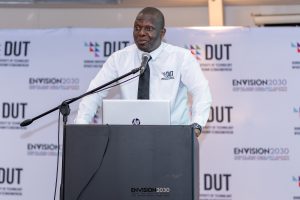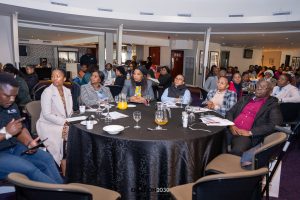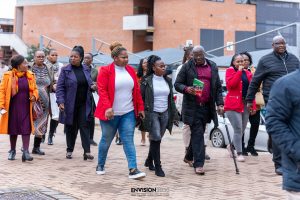The highly anticipated 2023 Principal and Life Orientation (LO) Educator Breakfast Seminar, which is hosted annually by the Durban University of Technology (DUT), took place at the Golden Horse Hotel in Pietermaritzburg, on Thursday, 24 August 2023.
The DUT Principal and Life Orientation Educator Breakfast Seminar was aimed for schools across the province from all 12 districts of which the majority came from uMgungundlovu. This prestigious event was hosted by the University’s student recruitment department at the Corporate Affairs. The dynamic DUT student recruitment team consisting of Dr Nishi Ramrathan, Tex Peters, the charismatic Michael Zulu, under the helm of manager, Mr Alex Mdletshe, did a sterling job bringing the event to the fore.
The event saw principals and Life Orientation teachers converge from schools such as Linpark High School, EPS Secondary School, Amakholwa Secondary School, Bhanoyi Secondary School and Bhekuximba High School, to name but a few, to the seminar.
Mr Zulu was the programme director of the event who expressed his delight in welcoming the guests to the prestigious event. He then introduced Ms Lorna McCullough, Senior Lecturer at the Department of Applied Management at DUT Midlands. She gave an introduction of the DUT values and principles; as well as simplified the ENVISION2030 strategy map to ensure that the invited guests have a better understanding of ENVISION2030.
“ I will give you a brief view of what DUT stands for. You may heard our ENVISION’s2030 which is a bespoke, homegrown strategic plan ENVISION2030, so our plan comes to fruition by 2030. The important part of the ENVISION2030 is our DUT way which is very firmly education based in a value system. If you think about what’s happening not just in South Africa but around the world, you hear things happening like corruption and fraud, you just realise the importance of having a moral campus,” she said.
She explained that the ENVISION2030 there is no mission or vision statement, but it’s all imbedded in a whole new look. She spoke of each perspective from stewardship, society, systems and process and sustainability and how these four perspectives of the strategy map are constructed strategically to produce inter-related pathways towards an envisaged aim of contributing to improved lives and livelihoods, which is manifested in a University that is engaged in a dynamic and impactful relationship with society at large, and the production of graduates who are innovative and demonstrate capacity both to respond to and to lead change.
The programme director then gave insight into the calibre of staff that DUT has. “In the words of our vice-chancellor and principal, Professor Thandwa Mthembu, we are in a rocket but without the right people we may not get to our destination, so it’s important that we have the right people in the right places,” he said.
He then gave the stage to Dr Joe Molete, Director of the Midlands Campuses, who spoke about enhancing collaboration through the Imbali Education and Innovation Precinct (IEIP). Dr Molete indicated that he was delivering his presentation on behalf of executive management, as they were not able to come and sent him to represent them.
“My talk will deal around the project on the Imbali Education and Innovation Precinct (IEIP). We have a draft plan with a mission to develop a fully articulated, smart, regional, integrated precinct. That precinct has specific goals. The first is to get people together so that we can collate and collaborate because it is through collaborations that we can make a difference. That precinct also talks about integrated planning that we need to learn better. It also is focused on strengthening our education system so that we improve articulation from one stage to the next as well as teaching relevant courses. It talks about improving our infrastructure, both our physical infrastructure and our digital ecosystem. It also talks about us (DUT) building innovation hubs so that we can teach our learners relevant, practical classes, such as 4IR, that’s all part of the plan,” he said.
Dr Molete further spoke on how the IEIP was conceptualised saying that the precinct concept was proposed by Minister Nzimande in 2014, as a mechanism to pilot and explore an alternative modality of education delivery. “The Imbali Education Precinct (IEP) is intended to be the first of three precincts to be established as part of the new National Plan for Post-School Education and Training,” he stressed.
Further on, Ms Nontokozo Ngcobo, Manager: innobiz DUT Centre for Entrepreneurship and Innovation, focused her presentation on entrepreneurship and a success story of an entrepreneur who was a product of innobiz. She also spoke of the ‘adopt a school’ project with the main aim entails primary and high learners and speaking about entrepreneurship as a source of employment to end poverty. She said they adopted 18 schools out of 165 with the aim to start creating this awareness of entrepreneurship and technology such as the Vumanhlamu Primary School in Nkandla.
Giving feedback from her perspective was Dr Mamothibe Amelia Thamae who spoke on behalf of Dr Nonhlanhla Mthiyane, Senior Lecturer and Head of School of Education at the Durban University of Technology. Dr Thamae explained more on the postgraduates in education. An exciting element to the presentations was the Fourth Industrial Revolution (4IR) presentation by Mr Ebrahim Asmal, senior lecturer at the Department of Information Technology. He explained the meaning and how the current era of connectivity, automation, and advanced-manufacturing technology is transforming global business and education.
Asmal explained more on Artificial intelligence which has enabled people to do things faster and better, adding that there isn’t a single law in the world relating/governing Artificial Intelligence which is unreliable and can be misused.
“As an educator, Artificial Intelligence is like an intern, someone that takes care of the small/menial tasks like marking, so you have time to do more important things. As a learner, Artificial Intelligence is like a tutor. Artificial Intelligence can help provide individualised support for all subjects. As a manager, Artificial Intelligence is like a statistician. Artificial Intelligence can help provide personalised reports. Artificial Intelligence is here, and it isn’t going anywhere. As educators, we need to equip and guide learners. In this technology modern world asking students not to use Artificial Intelligence for their work is counterproductive,” he said.
Asmal delved into various terminologies such as Predictive and Generative Artificial Intelligence tools such as ChatGPT, Google Artificial Intelligence, YouChat and Microsoft Copilot. He also focused on Fifth Industrial Revolution (5IR), saying that in the first two industrial revolutions, people had to adapt their lifestyle to what the machines could do.
“The third and fourth revolutions were hard on humans and hard on the environment. The fifth Industrial Revolution is different. Human beings are now front and centre in the production process. The fifth Industrial Revolution can be summarised as the combination of humans and machines in the workplace. We need to develop the right skills on the continent which will be critical to achieving fifth Industrial Revolution success. We need to prioritise the development at country level and our governments need to ensure that universities are on board and developing the right courses to prepare students for the new jobs that will emerge as a result of the fifth Industrial Revolution. Developing the right skills will play a critical role in realising the promise of the fifth Industrial Revolution,” he stressed.
The presentations culminated to an end, the delegates were then treated to a campus tour of the Engineering department at Indumiso campus, followed by a scrumptious finger lunch. Life Orientation Teacher, Crystal Peterson said: “It was a wonderful event and we (Marcel Moorhead, Linpark High School) and I are so pleased that DUT acknowledges life orientation teachers as we feel that we don’t get too much credit in our schools and from the department of education. For us this was amazing. We can go back to school reenergised and ready to take on what we have left for the rest of the year.
All in all, the consensus given by principals were that they would love for the learners from their schools to also be part of the event and do site visits and experience what they have experienced on the wonderful tour.
Pictured: Attendees at the Indumiso campus tour.
Waheeda Peters



